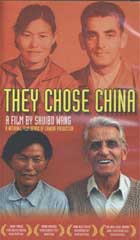
They Chose China 2005
Distributed by First Run/Icarus Films, 32 Court St., 21st Floor, Brooklyn, NY 11201; 800-876-1710
Produced by National Film Board of Canada
Directed by Shuibo Wang
VHS, color, 52 min.
College - Adult
History, Korean War, Military Studies
Date Entered: 11/01/2006
Reviewed by Sheila Intner, Professor Emerita, Graduate School of Library & Information Science, Simmons College GSLIS at Mt. Holyoke, South Hadley, MAThis well made documentary film is the epitome of professionalism. It has excellent camera work, acceptable audio, carefully edited live action and archival footage woven into a unified piece of AV fabric, and it tells a compelling story, all of which combine to make it a good view. The bottom line, however, is that it is also disturbing, because its subject is easily used manipulatively for propaganda purposes. This reviewer could not help but sense an underlying agenda, well camouflaged, that seems to lurk beneath the surface. Ostensibly, it claims to serve the goals of historical documentation and world peace; but, perhaps, these worthy goals are being interpreted from a particular perspective.
Filmmaker Shuibo Wang has undertaken to discover and document the history and current status of 21 Americans taken prisoner in the Korean War who, when the conflict ended, renounced repatriation to the United States and chose to go to China. Mainly, it focuses on the stories of three men, two white and one black, who lived in China for many years - learning Chinese, going to school, working, marrying, and having children - before returning to face the music back home. Viewers watch them talk to world class interviewers like Mike Wallace, among others, explaining why they did not want to go home at the end of the war, what they encountered in their new homeland, and, most critical of all, why they eventually returned to the U.S. to be incarcerated in a military prison.
Viewers learn that the three central figures are ordinary Americans. Unlike their comrades-in-arms, however, they came to believe what they were told about Communism and its desire for world peace and equality for all. The men held strong anti-war views they felt would bring McCarthy’s wrath on their heads and were painfully aware of the inequalities of American life, especially the African Americans. That what they heard was all part of a POW indoctrination program is explicitly stated, but that these men might have been selected for special treatment for reasons only the Communists knew for sure, is not.
Why did they go home? One says that when he first came to China, he was called “Comrade” and made to feel part of China’s “family.” After several years, he was called “Peace Fighter,” which was still good, but no longer family. After several more years, he started to be called “Mister,” indicating rejection from family status and China’s force for world peace.
They Chose China can support courses teaching about prisoner of war experiences in general and the Korean War in particular. Viewers should not neglect, however, thinking about who is telling this particular story and what their motives in telling it might be. Recommended with reservations.
Awards
- Jury Prize, 2006 Black Maria Film Festival
- REMI Award, 2006 World- fest Houston
- Golden Gate Award, 2006 San Francisco Film Festival